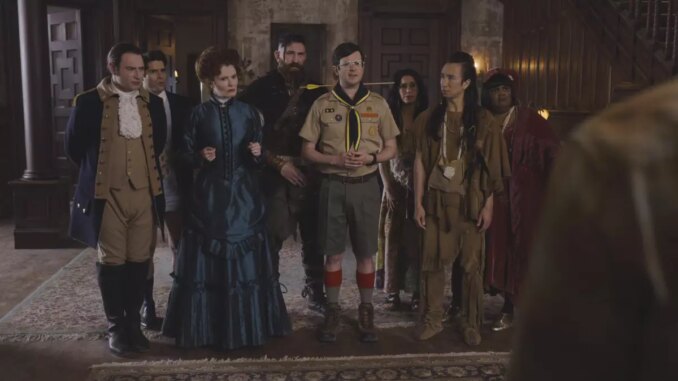
The sprawling, sun-drenched estate of Woodstone Manor, home to a spectral ensemble of diverse historical figures, is the vibrant heart of CBS’s Ghosts. Among its most delightfully rigid and surprisingly nuanced residents is Captain Isaac Higgintoot, a Revolutionary War soldier whose pompous pronouncements and antiquated etiquette often serve as comedic fodder. Yet, beneath the powdered wig and the declarations of historical grandeur lies a profound, hidden truth: Isaac was a closeted gay man. The actor who brings this complex spirit to life, Brandon Scott Jones, openly admitted that portraying Isaac – specifically his suppressed sexuality within an unforgiving historical context – made him profoundly nervous. This apprehension, far from being a limitation, was a testament to the role's delicate balance of humor and heartbreak, historical accuracy and contemporary representation, and the actor’s deep commitment to honoring a character’s full, often tragic, truth.
Firstly, the very premise of a closeted Revolutionary War soldier presented a unique tightrope walk between historical fidelity and potential anachronism. The late 18th century was not a time of progressive enlightenment regarding sexual identity. Homosexuality was not merely frowned upon; it was often criminalized, considered a moral depravity, and could lead to ostracization, imprisonment, or worse. To portray a character living in such an era, burdened by a secret that could destroy his life and legacy, requires immense sensitivity. Jones, as an openly gay actor, carried the weight of this history. He understood that Isaac’s closet was not a casual plot device but a cage forged by societal prejudice, a constant source of fear and internal conflict. His nervousness stemmed from the imperative to convey this historical reality without making Isaac a caricature, or worse, trivializing the very real dangers and emotional torment faced by LGBTQ+ individuals of that period. He had to ensure Isaac's struggle felt authentic, not just a modern sensibility projected onto the past.
Secondly, Ghosts is, at its core, a comedy. Its humor often springs from the clash of historical personalities with modern life, or from their individual eccentricities. The risk, therefore, was turning Isaac's deeply personal secret into merely another punchline. A less skilled or less conscientious actor might have leaned into stereotypes or reduced Isaac's identity to a simplistic gag. Jones's nervousness was a safeguard against this. He recognized that while Isaac's preening vanity and obsessive pride could be comedic, his sexuality had to be handled with poignancy and respect. The show masterfully navigates this by often revealing Isaac's desires through subtle longing – his crush on Alexander Hamilton being a prime example – and moments of genuine vulnerability that contrast sharply with his usual bluster. Jones’s performance allows Isaac to pivot seamlessly from arrogant self-importance to quiet, heartbreaking loneliness, illustrating the profound cost of his hidden life.
Finally, the role of Isaac Higgintoot carries the significant responsibility of representation. For many LGBTQ+ viewers, seeing a historical character, even a fictional ghost, acknowledge and grapple with their queer identity is a powerful act of visibility. It reclaims a past that often erased such stories, suggesting that queer individuals existed, loved, and struggled in every era, even if history books neglected to mention them. Jones understood the profound impact this could have. His nervousness was born from the desire to do justice to this representation, to ensure Isaac resonated as a fully fleshed-out human (or spectral human) being, whose unlived life and unexpressed desires spoke to a universal longing for acceptance and love. He had to ensure that Isaac's story was not just a narrative detail, but a beacon for those who might feel similarly unseen in history or in the present.
In conclusion, Brandon Scott Jones's nervousness about playing the closeted Revolutionary War soldier on Ghosts was not a flaw but a profound strength. It was the mark of an actor deeply committed to his craft and to the integrity of his character. This apprehension fueled a performance that expertly balances the show's comedic tone with the weighty reality of historical oppression, transforming what could have been a simplistic caricature into a nuanced, relatable, and ultimately deeply moving portrait of a man forever trapped by his era, yet slowly finding freedom in his afterlife. Isaac Higgintoot, through Jones’s sensitive portrayal, becomes more than just a ghost; he becomes a powerful, poignant illustration of a life lived in secret, and a testament to the quiet bravery of those who, against all odds, dared to love.